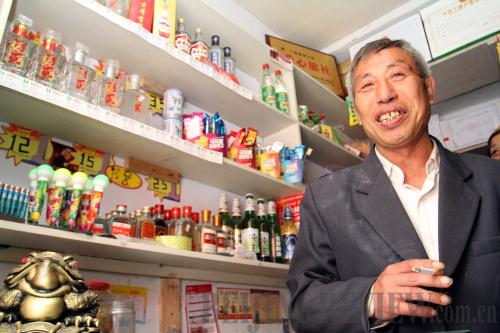|
 |
|
FREEDOM REGAINED: Zhao Zuohai, a farmer from Henan Province who was wrongly imprisoned for 11 years on a murder charge, at a hostel he runs with his wife, on April 20 (CFP) |
In May 2010, Zhao Zuohai, a farmer from Zhaolou Village, central China's Henan Province, became a household name in
China overnight. After languishing in jail for 11 years as a convicted murderer of a fellow villager, Zhao was declared innocent and released after his alleged victim returned home on April 30.
Later investigations showed that the wrongful conviction was largely based on Zhao's own confession, which was extracted under torture by the police.
In May 1999, police investigators dug out a headless body from a well in Zhao's village. They believed the man to be Zhao Zhenxiang, who had gone missing in October 1997 after a fight with Zhao Zuohai over a woman they were both romantically linked to.
Zhao Zuohai had been tortured for 33 days before his confession. Five police officers were sentenced to jail for torturing him in 2012. Four days after Zhao Zuohai's release, he received 650,000 yuan ($103,000) in state compensation. While his loss of freedom and absence from the lives of his four children for a decade cannot be compensated by money, the country's top legislature has acted quickly to ensure that such a miscarriage of justice will never be repeated.
The Criminal Procedure Law amended in 2012 makes it clear that confessions by a suspect or a defendant obtained through extortion or other illegal means, and witness' testimony and victim's statements obtained through the use of violence, threats or other illegal means should be excluded from evidence.
The newly amended law also clearly stipulates that no person may be forced to prove his or her own innocence, and no criminal suspects or defendants may be forced to confess.
China's legislative improvements to prohibit the exacting of evidence through torture or other illegal means by judicial officials is on record in the country's first government white paper on judicial reforms, which was issued on October 9.
Straight reforms
As early as the 1980s, China has initiated reforms in court trials and promoted professionalism in the judicature, with a focus on enhancing the function of court trials, expanding the openness of trials, improving attorney defense functions, and training professional judges and procurators.
In 2004, China launched large-scale judicial reforms based on overall planning, deployment and implementation.
Through the reform process, China improved the structure of its judicial organs, division of judicial functions and system of judicial management, established a judicial system featuring clearly defined power and responsibilities, mutual collaboration and mutual restraint, and highly efficient operation, according to the white paper.
China initiated a new round of judicial reform beginning in 2008, featuring the goals of optimizing the allocation of judicial functions and power, implementing the policy of balancing leniency and severity, building up the ranks of judicial workers, and ensuring judicial funding.
The tasks of the judicial reform have been basically completed, as relevant laws have been amended and improved, the white paper said.
However, judicial reform—an important part of China's overall political reform effort—remains a long and arduous task, the white paper says. It also urges continuous efforts to strengthen reforms with a goal of establishing a "just, effective and authoritative socialist judicial system with Chinese characteristics."
Jiang Wei, head of an office in charge of the country's judicial system reform, said at a press conference on October 9 that as a highly populous developing country, China still has problems in its judicial system.
Jiang admitted that the country's economic and social development does not match the people's increasing expectations for social justice and its judicial system's capability does not meet the demand for judicial service.
But the official emphasized that China's judicial system would be based on its current reality, instead of merely a copy of other countries.
"The problems can only be solved with a Chinese approach and wisdom. Imitating foreign experience or foreign systems could lead to a poor outcome," Jiang said, responding to a question about whether China's judicial system should follow Western models.
However, he said, China is keen to learn from the experience of other countries and will try to incorporate judicial concepts and practices utilized elsewhere.
Rights protection
| 